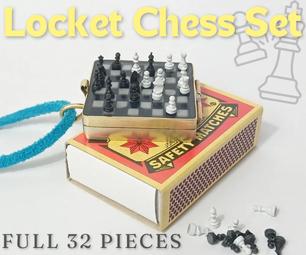Introduction: Million Micron Millenium Falcon
The Star Wars Identities Exhibition just came to town, with its amazing displays of original concept Art, models and costumes from the original movies. Ever since then my son's been pretty obsessed with Star Wars, and so the two of us have been making toy sized starships out of cardboard and other materials.
One day as I started clearing out the junk from my workshop, I realised that the piles of junk reminded me of the scrappy cobbled-together interiors of the Millennium Falcon. What if I made an abstract junk collage artwork of the Millennium Falcon? Seemed plausible...
Well, shortly after that my TV joined the Dark side, which provided the inspiration and materials for me to make Darth Vader's Star Destroyer as a complement to this project. Check it out here!
Step 1: Inspiration
These were the original concept plans and original model of the Millennium Falcon that I had seen at the Star Wars exhibition. I thought, wow, nobody has as large of a Millennium Falcon model as that at home. Even the $1000 Lego Millennium Falcon isn't as big as the one on display!
Well when the idea came to me to make a junk art Millennium Falcon, I decided that it had to be as huge as possible to make a statement on the wall.
Step 2: Start With a Rough 3D Model
Well I had the perfect wall for this! Two walls in fact - two opposite walls on my landing that have some old artwork I'd drawn years ago, begging for an upgrade.
So into Sketchup I went, to model out the room, and to model out the two starships at scale: One Millennium Falcon near the window (the light side) and one Super Star Destroyer on the inner wall (the dark side).
I'd just imported the 2D plans of the Millennium Falcon into Sketchup as a reference image and traced around it, as seen here. This let me size it perfectly to fit the plywood panel that I had available.
Step 3: Making a Plywood Armature
I sized the Millennium Falcon to fit the sheet of plywood I had in stock, which was 970x730mm. (Just some leftover material from another project). The beauty of doing this in Sketchup is that if you need to scale the overall model slightly to fit your material size, you can do that instantly.
The easy way would be to just plot these out on a large format printer, but since I was on lockdown at home I drew it all up with rulers and T-squares the old fashioned way. For the radial lines I used a pencil and a string, with a screw in the centre of the circle.
I cut the outline with a jigsaw and hand-sanded it smooth.
Step 4: Gathering Junk Materials
I started to clear out my workshop stash with a vengeance. Everything was either classified as good usable materials, recyclables (cardboard etc), or stuff to go on the artwork. And in the end I had a couple of boxes of workable junk to use, including some contributions from my father's junk stash as well.
Notable random junk:
- Parts of an old TV (Whatever was leftover after cutting the Star Destroyer frame)
- Broken Handheld Vacuum cleaner
- Dead Solar Garden Spotlights
- Burnt Out Power Extension Strip
- Old Toothbrush
- Old toy cars, trucks, etc
- Old Android TV box
- Old analogue circuit timers
- Old Lawn Sprinkler
- Lots of old curtain track hardware (the bits with tiny wheels that run along the track)
- 3D printer filament spool
- Webcam wall mount bracket as the Satellite Dish
... and much much more.
My aim was this: use what I could, and vow to throw away everything else that's unused at the end of the project!
Step 5: Assembling the Junk Collage
Here's how I built out the junk collage:
I knew I wanted it to be abstract, but with some reference to the main 'features' of the Millennium Falcon. Also, I thought I would make it as if the left half was a 'cut-away view' of the innards of the ship, while the right half would be the closed exterior panels of the ship.
a) Central Hub made out of an empty spool from 3D printer filament plus an old lawn sprinkler. This also gave me the necessary height in the middle of the piece to create an overall 'domed' shape to the starship.
b) Cockpit branch made out of an old power extension cord and a round headed motion detector. It helps to open up every piece of junk to reveal the insides, which are far more interesting than the outsides as a collage.
c) Old Android box (opened up) for the left axis, and a (closed) Handheld Vacuum Cleaner and old computer mouse as the right side axis
d) 3 Solar Spotlights and 3 round Solar Panels as the 6 circular portals at the top
e) Everything else arranged in radiating lines from the centre. Toy cars opened up and displayed with the cavity up. Curtain track pieces made lovely mechanical looking lines.
I just layered and layered it all until I got the result I wanted, holding everything in place with construction adhesive and hot glue. Heavier pieces are screwed down to the plywood.
Step 6: Cutting the Starship Exterior Panels From an Old TV
For the right side, I wanted to create an exterior shell of the ship for contrast.
I cut out a new cardboard template, then split it into radiating pie-slice panels to fit around the already-glued junk.
Thankfully I had enough pieces leftover from the TV panel casing to use here. I traced the template pieces, allowing for some overlap, and cut them out. I tried using an electric jigsaw, but it actually melted the plastic too much! So most of the pieces were cut with a plain old box cutter/razor blade, with a little assist from the jigsaw in complicated corners. The edges were sanded smooth with 160 grit sandpaper.
Step 7: Assembling Exterior Panels
The exterior panels were cut to size and assembled with more construction adhesive and clamps, with spacer blocks to give the panels a domed formation towards the centre.
The edges were finished with pieces from the front frame of the TV, screwed along the curved edge of the plywood.
Details were added such as an old webcam mounting bracket as the satellite dish, and other bits and bobs.
And with that, the difficult part was pretty much done.
Step 8: Spray Paint Everything
I took everything outside and masked the parts I didn't want to paint with masking tape. Then everything else was given a few coats of paint, starting with a medium grey and ending up with a lighter grey. When working with two colours, it helps to start with a darker colour, then spray the lighter colour from one side, to get a 3D effect. The darker grey emphasises the shadows, while the light coat of the lighter grey picks up the highlights.
Step 9: Add LED Strips (to Be Done)
This step is pending. I'll drill holes in the back of the Millennium Falcon and thread LED strip through the holes to make it glow from the inside.
I've ordered LED strips with a Bluetooth controller, like in the picture, so that I can program them with an app to turn on and off to a preset colour and program. Once programmed, they won't need to be connected to a phone to run the timed program.
The idea is that both the Millennium Falcon and Super Star Destroyer can be programmed to turn on and glow as a super cool nightlight at bedtime!
Step 10: Wall Mount the Artwork!
I used a French Cleat to mount this to the wall. Just cut a plank of wood at a 45degree angle lengthwise, using a circular saw, and attach one side to the wall and the other side to the artwork as shown.
Sometimes a French Cleat isn't so appropriate as it leaves a gap between the object and the wall. But in this case the offset is perfect as it gives a floating effect, and allows the LEDs to create a glow all round the Star Destroyer!
Step 11: Enjoy!
And there it is! A one-of-a-kind artwork that turned heaps of junk into the biggest and most original Millennium Falcon sculpture in anyone's home (or at least anyone that I know of!)
I love how it hangs directly opposite the Super Star Destroyer, which has its own Instructable here:
https://www.instructables.com/Upcycling-a-TV-to-HUGE-Super-Star-Destroyer/
Oh, and the title: Million Micron Millennium Falcon just means that it's about one metre long (one million microns is a metre)
If you liked it, please vote for me in the Fandom contest!

Grand Prize in the
Fandom Contest











